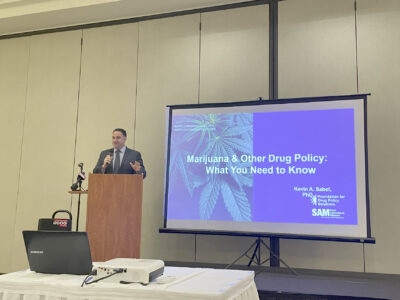Dr. Kevin Sabet discusses dangers of marijuana

OBSERVER Photos by Gregory Bacon Kevin Sabet with Smart Approaches to Marijuana speaks at a community presentation Monday in Celoron. He also gave a presentation at SUNY Fredonia.
- OBSERVER Photos by Gregory Bacon Kevin Sabet with Smart Approaches to Marijuana speaks at a community presentation Monday in Celoron. He also gave a presentation at SUNY Fredonia.
- Pictured is Kevin Sabet’s book “Smoke Screen: What the marijuana industry doesn’t want you to know.”
That was one of the main arguments made Monday by Dr. Kevin Sabet with the nonprofit organization Smart Approaches to Marijuana. He gave a community presentation entitled “Marijuana Legalization in Chautauqua County” in both Celoron at the Chautauqua Harbor Hotel and at SUNY Fredonia.
Sabet, who authored the book “Smoke Screen: What the marijuana industry doesn’t want you to know” was invited to Chautauqua County by Sheriff James Quattrone more than two years ago. Due to the pandemic, his visit was delayed until now.
Sabet worked as a government advisor who began in the Clinton Administration as a researcher, and later was the senior speechwriter on drug policy in the Bush Administration. He returned to government in 2009, where he was asked to assist in drafting President Obama’s National Drug Control Strategy as a senior advisor. In 2011, he stepped down after being the only drug policy staffer to have served as a political appointee in both a Democrat and Republican administration.
Sabet admits there are no easy answers when it comes to America’s drug problems. In fact, even with fentanyl being the leading cause of death of individuals 18-49, more people today are still dying from smoking, alcohol and prescription narcotics, all which are legal forms of drugs. Now in New York, marijuana is joining that legalized group.

Pictured is Kevin Sabet’s book “Smoke Screen: What the marijuana industry doesn’t want you to know.”
“I feel like marijuana is the most misunderstood drug in our country right now,” he said.
That’s because it’s not well regulated and is much stronger than it was 30 years ago. “This is not your mama’s weed at all. It’s genetically bred and super highly potent,” he said.
Sabet isn’t calling for people who use marijuana to be imprisoned, but rather is concerned that there appears to be a movement to promote marijuana, rather than discourage its use.
“I’m here to maybe throw a little bit of cold water on the idea that this is going to solve our economic problems, cure cancer, get rid of gangs, and be a wellness tool. Anything that is sold to be that perfect, we need to be a little skeptical of,” he said.
Sabet noted how in the past, smoking tobacco was “cool.” It was not only legal to smoke cigarettes, but also it was pushed by businesses, celebrities and even government as a way to generate sales and make a profit.
He’s concerned that marijuana could be headed on that same path. “When we legalize, normalize, and commercialize any substance, that increases harm,” he said. “The harm of the drug is not only the biological properties of the drug. It’s the social context, it’s the business context, it’s the normalization, the cultural context.”
Sabet believes marijuana should be avoided by individuals under 25 years old, because their brains are still forming. Also, if someone waits until they are an adult, the chances of that person becoming addicted to marijuana, or any drug, is highly unlikely.
He did say that he’s not concerned about adults who sit at home, away from children, and use marijuana for their own pleasure. Instead, too many adults are using the drug in front of children or get behind the wheel of a vehicle. Also, billboards and dispensaries advertise marijuana placed in candies, which is attractive to children and can entice them to try it.
Instead, Sabet wants to see the community push prevention. “The north star is to discourage its use,” he said.
The forum, including a question-an-answer session, was about two hours.
Jamestown and Dunkirk have both opted in for the possibility of having marijuana dispensaries. Sabet is concerned that selling the drug won’t benefit the communities. “The idea that this is going to be bringing rural prosperity, or suburban or urban … really I think is a fool’s narrative,” he said.
Nationwide, most of the marijuana dispensaries are located in poorer communities. Sabet said that’s partly because wealthy neighborhoods don’t want them, in part because of the problems that arise around them.
Attending the event was Michael Faulk, Chautauqua County interim public health director. After the event, Faulk was asked his thoughts about the possibility of marijuana dispensaries opening locally.
“I’m not prepared to comment about that. I’d have to give that some thought,” he said.
Instead, Faulk wants to see his department get information out to the public with facts and not arguments. “Our challenge, I think from the health department’s standpoint, is earning the public’s trust back. With COVID and all the political divisiveness in regards to the COVID vaccines and treatments, it really created a difficult position for us in public health,” he said.
Quattrone said one of the purposes of the presentation was to share information among community leaders and educators. “I had opposed legalization of marijuana but it passed. Now we have to move forward and say how can we have the least harm from that,” he said.
Marijuana is not legal in Pennsylvania, but among those attending the presentation was Warren Sheriff Brian Zeybel. He noted how some state leaders believe it will be legalized this year, but he isn’t one of them.
Zeybel sees marijuana causing more problems than solutions. “The legalization of marijuana, I think is an initial step to the mental health/addiction as a whole and I don’t think it’s a positive thing,” he said.







